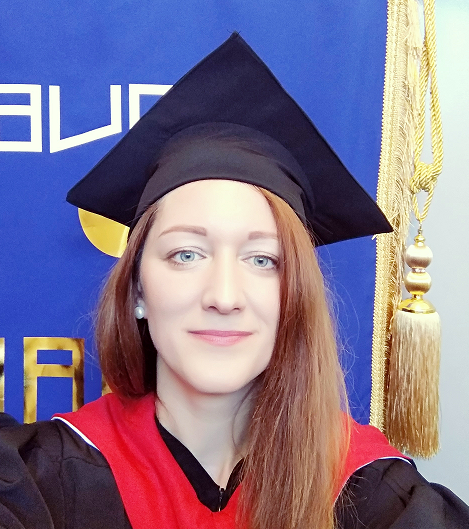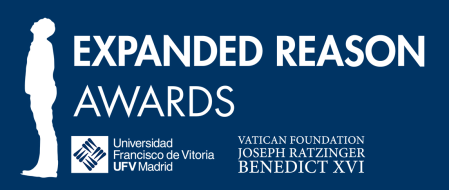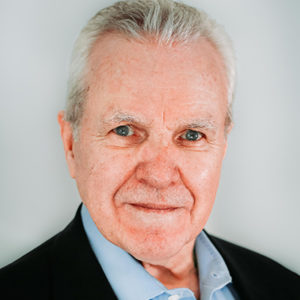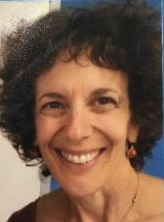Uncategorized
Forgiveness Infiltrates Central Asia’s Kyrgyzstan

Alyona Yartseva is spearheading forgiveness interventions in the former Soviet republic of Kyrgyzstan.
Alyona Yartseva moved in 2015 from Russia to Kyrgyzstan (officially the Kyrgyz Republic)–a mountainous country of incredible natural beauty in Central Asia. As she pursued her new life there, intent on helping others improve their own lives, she quickly came to realize that forgiveness is a valuable commodity not only for helping people overcome personal difficulties but also for helping tame the ethnic, political, and socio-economic tensions that simmered there and in surrounding countries that had all gained their independence with the fall of the Soviet Union in 1991.
Since Alyona moved to Kyrgyzstan, she has been on “a forgiveness rampage” that has included:
- Undertaking a 15-lesson online Forgiveness Therapy course administered by the International Forgiveness Institute (IFI) after convincing AUCA administrators to accept it as a fully-accredited graduate degree university course;
- Acquiring the Enright Forgiveness Inventory for Children (EFI-C), translating it into Russian, back-translating it, and working directly with Dr. Robert Enright, co-founder of the IFI, in modifying that research tool into what is essentially a new EFI Short Form known as the EFI-30;
- Validating the newly-adapted EFI-30 by using it, along with a checklist of physical health symptoms (a new measuring tool that she created herself), in a forgiveness research project with more than 150 participants;
- Participating in a four-month forgiveness intervention internship and conducting post-therapy interviews that “vividly demonstrated” to her the therapeutic effects and positive results of forgiveness;
- Conducting a hands-on forgiveness training program for her fellow-AUCA students to demonstrate the four-phases of Dr. Enright’s Process Model of Forgiveness and further expand the use of the EFI-30;
- Consulting with “no-charge clients” (as a student she cannot charge for her services) who were able to move towards forgiveness and improve their mental health;
- Obtaining and starting to translate into Russian Dr. Enright’s Anti-Bullying Forgiveness Program; and,
- Writing her thesis on “Subjective Effects of Forgiveness on Stress Level and Physical Health”–a project she conducted involving 150 adults of 3 nationalities and obtaining a Master of Arts Degree in Applied Psychology from the American University of Central Asia (AUCA).
One of the motivating factors for Alyona’s impressive foray into forgiveness activities was what she was unable to find when she was accepted as a graduate student at the AUCA in the capital city of Bishkek. Although she conducted exhaustive literature searches for anything related to forgiveness written in either the Russian or Kyrgyz language, she found absolutely none.
“As a believer in Jesus Christ, I’ve always understood the value of forgiveness but now I see it from a different professional perspective,” Alyona says. “I want to be able to demonstrate the effects of forgiveness (or unforgiveness) to my colleagues in Russian language publications.”
As Alyona looks ahead to the future, she says that once she completes translating the anti-bullying material she would like to personally introduce it to local school counselors. Following that, she plans to move to Uzbekistan where she wants to popularize forgiveness therapy among local psychologists. She plans to continue her forgiveness research together with a group of colleagues “who have a heart for forgiveness” and is pursuing foundation grants to fund their efforts.
“Dr. Enright’s Forgiveness Therapy is at the very top of my tool box as a counselor,” Alyona adds, “and I believe it is essential to promote and research forgiveness therapy and the positive effects of forgiveness in Central Asia.”
Alyona can be reached at: alyona.yartseva@gmail.com
Kyrgyzstan is a country in Central Asia–a region which stretches from the Caspian Sea in the west to China in the east, and from Afghanistan and Iran in the south to Russia in the north. The region consists of the former Soviet republics of Kazakhstan, Kyrgyzstan, Tajikistan, Turkmenistan, and Uzbekistan. The United Nations also includes Afghanistan as part of Central Asia. The region is also colloquially referred to as “the stans” as the countries generally considered to be within the region all have names ending with the Persian suffix “-stan,” meaning “land of.” ƒ
FORGIVENESS: The Basic Building Block of Loving Relationships
What comes to mind when you hear someone mention the term “therapy”? Do you envision a patient lying on a couch with a therapist sitting behind and nodding sagely as the patient talks about the shortcomings of his or her life? If so, it’s time to upgrade your thinking.
Thanks to less-than-accurate portrayals in movie and television docudramas, that approach to therapy (known as psychoanalysis) is still dominant in the minds of most individuals. And while it is still practiced, it is in the minority. There are now an estimated 400 different kinds of therapy used by practitioners around the world.
That’s but one of the many mind-altering revelations in a just-published book called Introduction to Psychology by Jorden A. Cummings (Associate Professor) and Lee Sanders (Sessional Lecturer), both in the Department of Psychology at the University of Saskatchewan in Saskatoon, Saskatchewan, Canada. The book offers a comprehensive treatment of core concepts, grounded in classical studies and current/emerging research.
Another major revelation of the new book is its focus on Positive Psychology–the study of happiness. While psychology has traditionally focused on dysfunction–people with mental illness or other issues–and how to treat it, positive psychology, in contrast, is a field that examines how ordinary people can become happier and more fulfilled–in other words, what makes life worth living.
Three Key Strengths
Within positive psychology, three key human strengths have been identified–forgiveness, gratitude and humility. While Introduction to Psychology provides meticulous coverage of those three strengths (Chapter 12.5), this post will focus on forgiveness. Here are excerpts from the book:
Forgiveness is essential to harmonious long-term relationships between individuals, whether between spouses or nations, dyads or collectives. At the level of the individual, forgiveness of self can help one achieve an inner peace as well as peace with others and with God.
“Forgiveness can be an avenue to healing. It is the basic building block of loving relationships with others.”
Introduction to Psychology
Because the potential for conflict is seemingly built into human nature, the prospects for long-term peace may seem faint. Forgiveness offers another way. If the victim can forgive the perpetrator, the relationship may be restored and possibly even saved from termination.
The essence of forgiveness is that it creates a possibility for a relationship to recover from the damage caused by the offending party’s offense. Forgiveness is thus a powerful pro-social process. It can benefit human social life by helping relationships to heal. Culligan (2002) wrote “Forgiveness may ultimately be the most powerful weapon for breaking the dreadful cycle of violence.”
“On a social level, forgiveness may be the critical element needed for world peace.”
Introduction to Psychology
Forgiveness studies demonstrate that self-forgiveness was associated with increased self-esteem, lower levels of anxiety, lower levels of depression and a more positive point of view.
In many of these studies, it was shown that people who are able to forgive are more likely to have better interpersonal functioning and therefore social support. The act of forgiveness can result in less anxiety and depression, better health outcomes, increased coping with stress, and increased closeness to God and others (Enright, 2001). ⊗
ADDENDUM:
Introduction to Psychology has been created from a combination of original content and materials compiled and adapted from several Open Educational Resources (OERs)—teaching, learning and research resources that reside in the public domain or have been released under an intellectual property license that permits their free use and re-purposing.
Compared to commercial textbooks and other commercial resources, OERs are: free to access, free to reuse, free to revise, free to remix, and free to redistribute.
This provides opportunities for instructors and learners to shape course content and meet the needs of specific learning contexts. Teachers and students become learners together, and content becomes a dynamic, always changing category to be engaged rather than a stable set of facts to be mastered.
This is called Open Pedagogy–the practice of engaging with students as creators of information rather than simply consumers of it. This dynamic, often called Open Education, is transforming lifelong learning in the process.
LEARN MORE:
- Click here to download the entire 1,064-page Introduction to Psychology.
- Click her to download other Open Educational Resources and Courses.
- Click here to discover the 10 Types of Psychologists.
- Click here to watch a TED Talk called The New Era of Positive Psychology by Martin Seligman, often called “the founder of Positive Psychology.”
Forgiveness Therapy Provides Quality of Life Benefits to Terminally-Ill Cancer Patients
Dr. Robert Enright and Dr. Richard Fitzgibbons Receive 2019 International Research Award
Two members of the International Forgiveness Institute (IFI) Board of Directors have been selected to receive an international award recognizing their Forgiveness Therapy research. Dr. Robert Enright, founder of the IFI, and Dr. Richard Fitzgibbons, MD, Director of the Institute for Marital Healing just outside Philadelphia, PA, have been named the 2019 recipients of the Expanded Reason Award.

The prestigious award is presented annually by the University Francisco de Vitoria (Madrid, Spain) in collaboration with the Vatican Foundation Joseph Ratzinger/Benedict XVI (Rome, Italy) “to recognize and encourage innovation in scientific research and academic programs.”
Recipients (only two researchers are selected worldwide each year) are determined by an international panel of seven judges who examine books and journal articles to ascertain who across the globe is conducting innovative and exceptional research that cuts across the social sciences. The award criteria includes the challenge of establishing a dialogue of particular sciences with philosophy and theology in line with the thought of Pope Benedict XVI who led the Catholic Church from 2005 – 2013.

Dr. Richard Fitzgibbons
Drs. Enright and Fitzgibbons co-authored the book Forgiveness Therapy: An Empirical Guide for Resolving Anger and Restoring Hope. The book, published by the American Psychological Association (APA) in 2015, signifies that Forgiveness Therapy is now rightfully taking its place alongside such historically accepted therapies as Psychoanalysis, Humanistic Psychotherapy, and Cognitive Behavioral Therapy.
Forgiveness Therapy is actually a new and updated version of a previous book by Drs. Enright and Fitzgibbons, Helping Clients Forgive, that was published in 2000, also by the APA. The new 358-page volume helps clinicians learn how to recognize when forgiveness is an appropriate client goal and provides concrete methods for working forgiveness into therapy with individuals, couples and families. It is grounded in theology, philosophy, psychiatry, education and the social scientific method.
Dr. Fitzgibbons is a long-time research associate of Dr. Enright’s. Trained in psychiatry, he has worked with hundreds of couples over the past 40 years. His book, Habits for a Healthy ![]() Marriage: A Handbook for Catholic Couples, is available at Amazon.com.
Marriage: A Handbook for Catholic Couples, is available at Amazon.com.

Dr. Robert Enright
Dr. Enright, in addition to founding the IFI 25 years ago, has been a professor with the University of Wisconsin-Madison School of Education’s highly-regarded Department of Educational Psychology since 1978. He is the author or editor of seven books and more than 150 publications on social development and the psychology of forgiveness. He pioneered forgiveness therapy and developed an early intervention to promote forgiveness–the 20-step “Process Model of Forgiving.”
Both Dr. Fitzgibbons and Dr. Enright have been invited to attend and formally accept their awards at the Expanded Reason Awards Ceremony on Sept. 19, 2019 at the University Francisco de Vitoria in Madrid.
The Expanded Reason Awards recognize extraordinary teachers and researchers.
The Awards Ceremony is part of the 3-day International Expanded Reason Congress in Madrid that brings together university researchers and teachers from all over the world. The Congress seeks to deepen the dialogue among science, philosophy, and theology through presentations, roundtable discussions, and workshops. Dr. Fitzgibbons and Dr. Enright will be outlining the concepts behind their winning project in a talk that will also be published in the official proceedings of the Congress.♥
The Impact of Using Children’s Literature to Teach 5th Graders about Forgiveness

Dr. Suzanne Freedman
A Guest Blog by
Suzanne Freedman, Ph.D.
University of Northern Iowa
“How children navigate their emotional world is critical to their life long success.”
Susan David, Emotional Agility
Recent statistics illustrate an increase in elementary school children dying by suicide (Dillard, 2018). Three nine-year old children took their own lives this past year and bullying was related to all three deaths. Hate incidents at school are increasing at alarming rates although most incidents of hate are not reported. Along with increases in suicide and suicide ideation, anxiety and depression in youth are on the rise (Dillard, 2018).
Helping students develop empathy toward others is a key strategy in bullying prevention and intervention and according to a recent NY Times article (Brody, 2018), it is critical that we help kids develop empathy early in their lives. Social emotional learning (SEL) programs that include a focus on empathy and regulation of emotions are being recognized as an important part of the school curriculum for all students (Zakrzeski, 2014) and based on recent statistics, there is a need for more SEL programs in schools today.
According to Cook-Deegan (2018), social-emotional learning teaches the key attitudes and skills necessary for understanding and managing emotions, listening, feeling and showing empathy for others, and making thoughtful, responsible decisions. Research illustrates that including social-emotional learning (SEL) in the curriculum is good for both students and their teachers (Zakrzeski, 2014).
Forgiveness education, with its focus on recognizing and validating students’ anger as well as teaching students to express emotions in a healthy way, understand the perspective of others, recognize the humanity in all, and increase empathy and compassion, is one form of social-emotional learning that is currently being investigated by researchers (Enright., Knutson, Holter., Baskin, & Knutson, 2007; Freedman, 2018).
The forgiveness education research project described here was based on a quasi-experimental pre-test post-test design with two classes of 5th grade elementary school students attending a low-income school in a Midwestern community. There were approximately 25 ten and eleven-year old students in each class representing a diverse group of races and ethnicities.
The forgiveness education curriculum consisted of 10 weekly lessons of 30 minutes in duration with two days of pre-testing and two days of post-testing. Although all students received the forgiveness education, only the students who returned signed consent forms from their parents completed pre and post-tests (30 out of 50 students total – 16 students in one class and 14 students in another class).
The forgiveness education was taught  by the researcher (and author of this blog) and occurred in each classroom on different days of the week. The same weekly lesson was taught in each classroom and the forgiveness education curriculum was based on Enright’s four-phase, 20-unit process model. Selected children’s literature was used to teach and illustrate forgiveness and related concepts to the students.
by the researcher (and author of this blog) and occurred in each classroom on different days of the week. The same weekly lesson was taught in each classroom and the forgiveness education curriculum was based on Enright’s four-phase, 20-unit process model. Selected children’s literature was used to teach and illustrate forgiveness and related concepts to the students.
Certain principles from the chapter, “Helping Children and Adolescents Forgive”, in Enright’s (2001) book, Forgiveness is a Choice, guided the education. First, the idea that it is always the child’s choice to forgive was highlighted. Second, the curriculum was developed with the understanding that children may not understand forgiveness in the same was as adults. Third, the point that forgiving and reconciling are not the same thing was emphasized. Fourth, the rationale for this education and research project was based on the realization that if children are going to learn about forgiveness they need to be educated about it and know that it exists as an option as well as the knowledge that children learn more deeply when challenged and encouraged.
After the project, quantitative results illustrated that students increased significantly in their forgiveness toward a specific offender from pre-test to post-test. Students reported being hurt by friends, siblings, mothers and other students. Students also showed significant increases in their knowledge of forgiveness from pre-test to post-test.
Qualitative results illustrated that students both enjoyed and benefited from the forgiveness education curriculum. Specifically, when asked about what they learned and enjoyed about the forgiveness education, 14 students reported that the forgiveness education “helped them learn to forgive someone”.
Specific statements included, “I like forgiveness because in the future we will meet other people that we do not like but we still need to forgive them”; “Forgiveness has helped me forgive people I couldn’t forgive in a long time”, “It helps me forgive people when they make bad choices”; and “I liked learning because I have learned how to forgive someone like I am trying to forgive someone right now”.
Ten students reported that learning about forgiveness helped them know more about “being nice and showing kindness to others”. Specific comments included, “Even if people you know are mean to you, you can still be nice to them. Don’t be mean to others”; “It helped me be nicer to my brother and friends”; and “You could always give a person that is mean to you a second chance because maybe the person that is being mean is having a bad day or got in an argument with their best friend”.
Nine students also reported that they “learned more about bullying” from the forgiveness education. Specific comments included, “Some bullies get bullied so they are letting their anger out on somebody else”; “People are just hurt inside when they bully”; Even though somebody is being mean to you, you could still forgive them”; and “When you have empathy you want to know how they feel and then you can put your feet in their shoes, and if you are getting bullied you can turn them into a friend by knowing how they feel”.
Seven students reported that they “learned ways to calm down and let go of anger as a result of the forgiveness education. Six students stated that the forgiveness education taught them that “we are all the same underneath”. Another six students reported that they “learned about empathy”. Additional responses by more than one student included, “Forgiving is hard”; “Forgiveness is a choice”; “You don’t need an apology”; Forgiving takes time”; “Forgive but not forget”; and “Revenge is not part of forgiveness”.
This study illustrates the potential of forgiveness education to improve elementary school students’ psychological well-being and interpersonal relations as well as the importance of including forgiveness education in the school curriculum. Students who learn how to forgive and decrease their anger in healthy ways will be less likely to be involved in bullying and other violent acts (Freedman, 2018). This research is encouraging and needs to be replicated with additional populations of children and adolescents.



